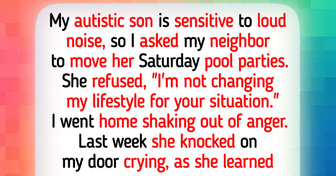15 Stories of Exes Who Can Turn Your Life Into a Nightmare

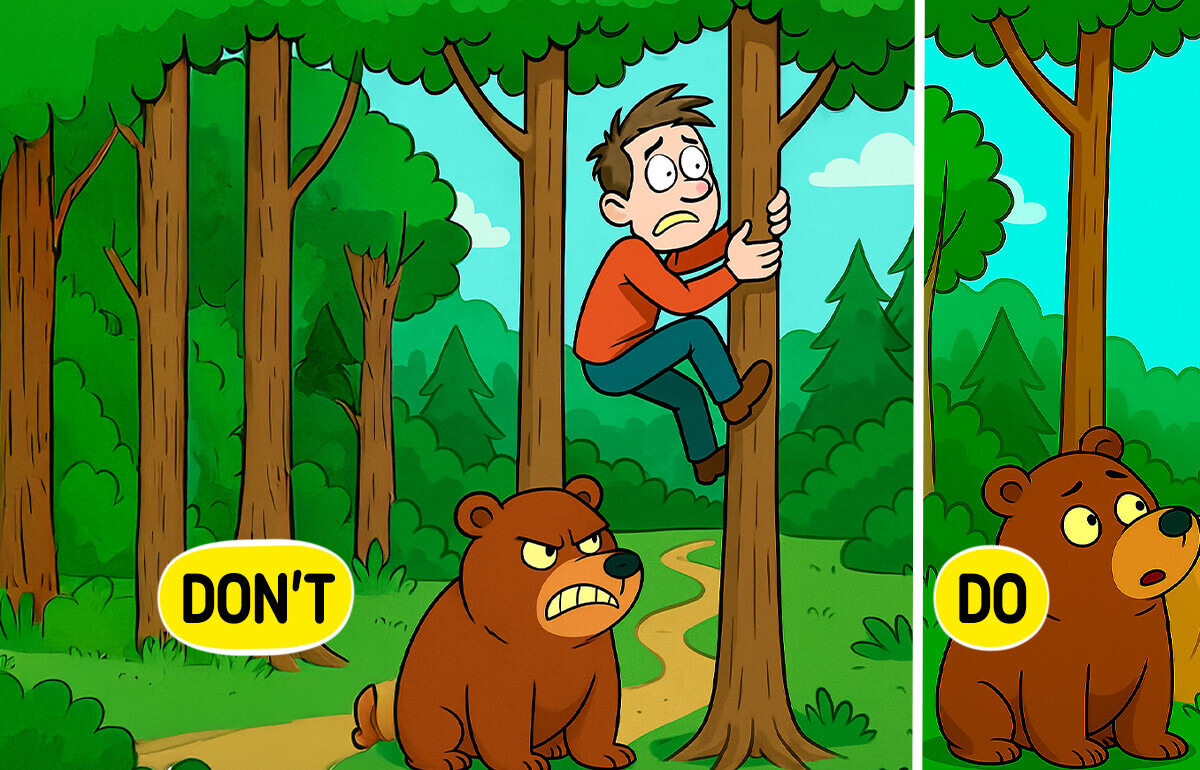
It seems bear encounters have been on the rise lately, even in areas where these animals aren’t usually found. The reasons vary: in some regions, authorities say the bear population has grown out of control, while in others the animals have lost their natural habitat, so they wander into human settlements looking for food. Either way, it’s important to know how to avoid running into a bear and how to stay safe if you unfortunately do.
This article is intended for entertainment purposes only. We make no representations or warranties regarding the completeness, accuracy, reliability, or safety of the content provided. Any actions taken based on the information in this article are strictly at the reader’s own risk. We assume no responsibility or liability for any loss, damage, or consequences arising from the use of this content. Readers are advised to exercise their own judgment, take appropriate precautions, and seek professional guidance if attempting to replicate any part of the content.
Stay on marked trails and only head out during the day. Bears are usually more active early in the morning and late in the evening, so hiking when the sun is up is safer. It’s also best to stay away from thick berry patches or areas where bears might like to feed.
Bears don’t want surprises. Talk loudly, sing, or clap, especially when you can’t see far ahead. Play music on a speaker if needed, just make sure you’re not bothering other people who may be on the same hike as you. If you spot signs like tracks or droppings, it’s smart to turn around and reassess your itinerary.
Hike in a group and stick close together. Keep kids nearby and never let dogs run loose, even if they’re friendly. Dogs can make things worse by startling bears or running back to you with one following behind.
Even if you just caught a glimpse of a bear, somewhere in the distance, make sure to report it to the proper authorities. Give as many details as possible, like its direction and overall behavior. This may be crucial information that can save other hikers or even the bear itself.
In Romania, for instance, where brown bears are common, especially along roads like the famous Transfăgărășan, tourists have stopped, taken selfies, and even offered food to bears, only to be attacked. One tragic incident on July 1, 2025, involved an Italian motorcyclist who fed a bear, posed for photos, and then tragically lost his life, despite wearing protective gear. Wildlife experts emphasize you must keep distance and avoid interactions. This helps keep both humans and bears safe.

Once you’re face-to-face with a bear, the most important thing is to stay calm. Speak in a soft, steady voice, so the bear understands you’re a person, not a threat. Stand still, gently wave your arms, and avoid sudden moves.
If the bear stands up or comes closer, it’s likely just trying to figure out what you are. Don’t run or scream; this could make things worse.
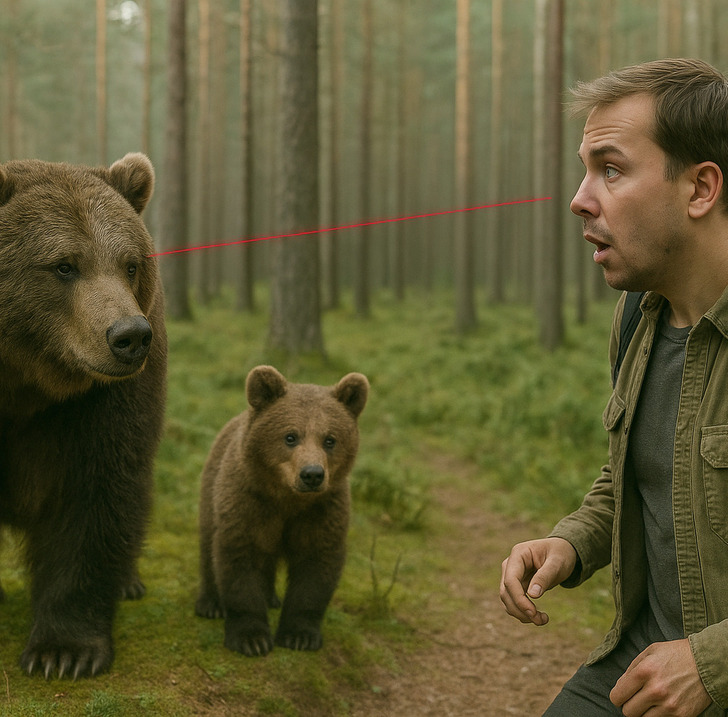
It’s important not to make eye contact with these animals. This may increase the chances of it perceiving you as a threat. Keep an eye on it, sure, but slowly back away, or slowly move sideways. There’s a good chance the bear won’t follow you.
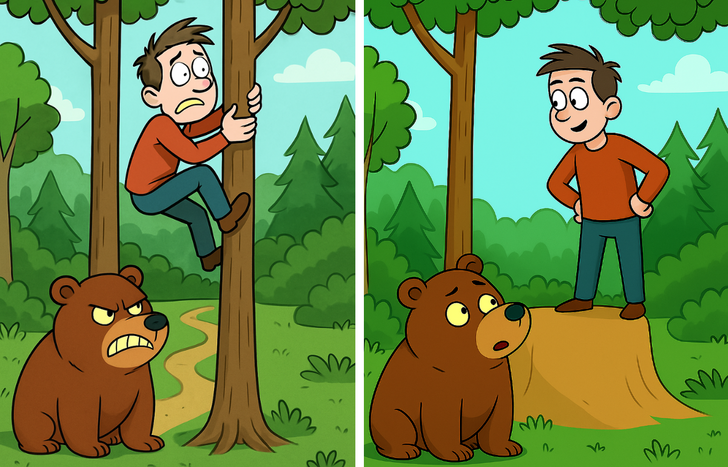
You can also try to look bigger. Raise your arms, hold up your backpack, or open your jacket wide. Stand tall and stay close to others if you’re in a group; don’t spread out.
If there’s a rock or small hill nearby, climb it to appear larger, but never run towards it. Staying calm and grouped together can help keep the bear from feeling too bold.
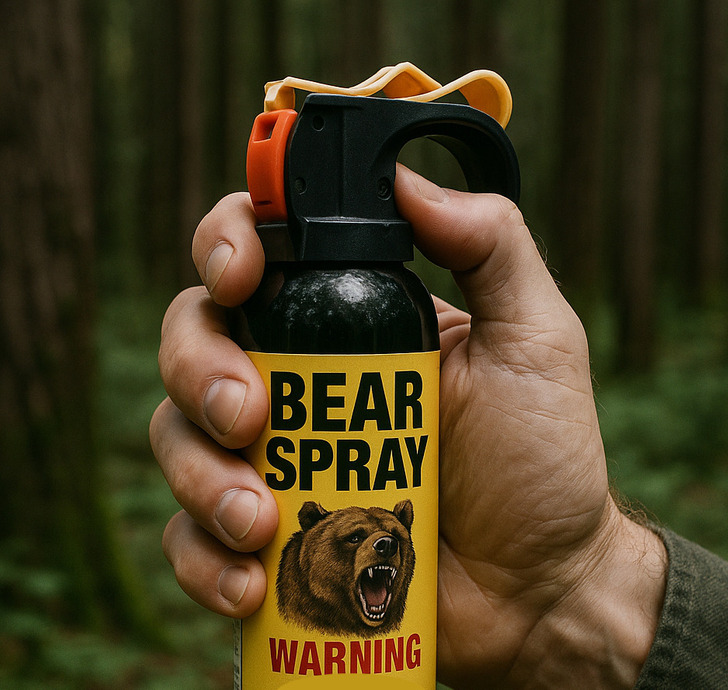
Bear pepper spray is a useful tool to carry when you’re in their territory. It’s meant to stop a bear that is charging or acting aggressively, but it’s not the same as regular pepper spray. Always choose a product made specifically for these animals. But don’t spray preventively on your clothes or gear because it won’t keep them at bay.
If a bear shows signs like yawning, huffing, or pounding the ground, it’s feeling stressed and could charge. This is serious, and knowing what kind of bear you’re dealing with can save your life.
If a black bear attacks, fight back as hard as you can. Aim for the face and use anything nearby to defend yourself. But if it’s a grizzly, the best thing to do is pretend you’re lifeless. Lie flat, cover your neck, and stay still until you’re sure the bear has left.
Climbing a tree to escape a bear is not a safe idea. Bears, especially black bears, are excellent climbers and can easily follow you up. And once you’re up a tree, you’ll have nowhere else to go.
Even grizzlies, though not as skilled at climbing, have chased people into trees before. It’s better to stay on the ground and use other safety steps instead.
Just because it’s not as large as a full-grown animal, it doesn’t mean that bear cubs are to be messed with. They can be pretty strong animals, too, you know. More so, chances are, if you see a baby bear, the mom isn’t too far behind. The females are known to be extra-protective of their offspring, and you’re likely to be perceived as a threat.
You might also enjoy this article. It covers practical ways to handle all kinds of wildlife situations, from snakes to sharks. If you’re always prepared, you can stay safe, and happily keep exploring.










